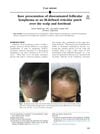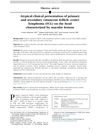Search
for
Sort by
Research
630-660 / 701 results
research Fabrication of Composite Pastes with Minoxidil-Loaded Nanoparticles and Valproic Acid for Androgenetic Alopecia Treatment
The study created a new hair loss treatment paste that regrows hair faster and with fewer side effects than minoxidil alone.

research Autologous Micrografts Containing Nanovesicles, Exosomes, and Follicle Stem Cells in Androgenetic Alopecia: In Vitro and In Vivo Analysis Through a Multicentric, Observational, Evaluator-Blinded Study
Micrografts are a safe and effective treatment for hair loss in both men and women.

research Investigating the Role of Various Extracellular Matrix in Androgenetic Alopecia: Insights from Immunostaining and Quantitative Analysis - A Pilot Study
ECM changes may play a role in hair loss, with differences between males and females.

research On The Diversity And Effectiveness Of Therapy Methods For Androgenetic Alopecia
Various treatments effectively manage androgenetic alopecia.

research Research Progress on Targeted Regulation of Hair Follicle Stem Cell Function in the Treatment of Androgenetic Alopecia
New treatments using stem cells and other methods show promise for promoting hair growth in androgenetic alopecia.

research Hair Regrowth with Micrografts Enriched with Human Follicle Mesenchymal Stem Cells and Platelet-Rich Plasma
Using micrografts with stem cells and platelet-rich plasma can safely and effectively help regrow hair.
research Canine And Feline Cutaneous Lymphocytosis: Reactive Process Or Indolent Neoplastic Disease?
Cats likely have a reactive skin condition, while dogs may have a more complex, possibly cancerous one.

research Xanthomatous Hypophysitis: Always Think Twice Before Pituitary Resection
Always consider xanthomatous hypophysitis before deciding on pituitary surgery.

research Hair Follicle Regeneration From Human Pluripotent Stem Cells
Scientists have found a way to create hair follicles from human stem cells, which could potentially be used to treat hair loss.
research SP0227 Case 1 Presentation: Arthritis, Lupus and More. Rhupus or Polyautoimmunity?
Managing multiple autoimmune diseases in one patient is very challenging.

research A Case of Recurrent Acute Pancreatitis Following Ocrelizumab Use
Ocrelizumab may cause pancreatitis in some patients.

research Distinguishing Immunohistochemical Features of Alopecia Areata from Androgenic Alopecia
Biopsy can differentiate between alopecia areata and androgenic alopecia, and if more information is needed, testing for CD3 and CD8 can help.

research Drug Reaction With Eosinophilia and Systemic Symptoms and Severe Involvement of Digestive Tract: Description of Two Cases
Severe digestive issues in DRESS need early endoscopy for better treatment.

research Alopecia-Associated Pseudocyst of the Scalp
A rare scalp condition causing hair loss and cysts in young men can be treated effectively with a specific steroid injection.

research Distinguishing Diffuse Alopecia Areata from Pattern Hair Loss Using CD3+ T Cells
CD3+ T-cell presence is a reliable marker to tell apart alopecia areata from pattern hair loss.

research Histopathology of Alopecia Areata, Acute and Chronic: Why Is It Important to the Clinician?
Recognizing the different stages of alopecia areata is crucial for accurate diagnosis and treatment.

research Methotrexate-Associated Lymphoproliferative Disorder: Sequential Development of Angioimmunoblastic T-Cell Lymphoma-Like Lymphoproliferation in the Lymph Nodes and Diffuse Large B-Cell Lymphoma in the Skin in the Same Patient
Stopping methotrexate might reverse lymphoma-like conditions in some patients.

research Rare Presentation of Disseminated Follicular Lymphoma as an Ill-Defined Reticular Patch Over the Scalp and Forehead
A woman with lymphoma had a rare skin rash on her scalp and forehead, which was hard to diagnose but responded well to treatment.

research Postmenopausal Frontal Fibrosing Alopecia: A Frontal Variant of Lichen Planopilaris
Frontal fibrosing alopecia is a hair loss condition in postmenopausal women, similar to lichen planopilaris, with ineffective treatments.

research Liver Transplantation for Propionic Acidemia in Children
Liver transplantation is a viable option for children with propionic acidemia, improving quality of life and diet, but does not remove all risks and long-term brain outcomes are uncertain.

research Safety of Dermatologic Medications in Pregnancy and Lactation
Most dermatologic medications are safe during pregnancy and breastfeeding, but some should be avoided due to potential risks.

research Presentation, Impact and Prevention of Chemotherapy-Induced Hair Loss: Scalp Cooling Potentials and Limitations
Scalp cooling can reduce chemotherapy-induced hair loss and should be available in all hospitals.

research Nanotechnology in Dermatology
Nanotechnology in dermatology shows promise for better drug delivery and treatment effectiveness but requires more safety research.

research Anti-MRSA Malleable Liposomes Carrying Chloramphenicol for Ameliorating Hair Follicle Targeting
DA liposomes with chloramphenicol effectively target hair follicles and combat MRSA with minimal skin toxicity.

research Scalp Cooling Has No Place in the Prevention of Alopecia in Adjuvant Chemotherapy for Breast Cancer
Scalp cooling is largely ineffective in preventing hair loss from breast cancer chemotherapy.

research Hair Restoration Surgery: The State of the Art
Hair restoration surgery has advanced, focusing on natural results and may improve further with new techniques and therapies.

research Bendamustine in Indolent Non-Hodgkin's Lymphoma: A Practice Guide for Patient Management
Bendamustine combined with rituximab is an effective and well-tolerated treatment for certain types of lymphoma.

research Tamoxifen-Induced Total Alopecia
Tamoxifen can cause total hair loss but its benefits outweigh this side effect.

research Atypical Clinical Presentation of Primary and Secondary Cutaneous Follicle Center Lymphoma on the Head Characterized by Macular Lesions
Some skin lymphomas can look like common skin issues and need careful testing to diagnose correctly.